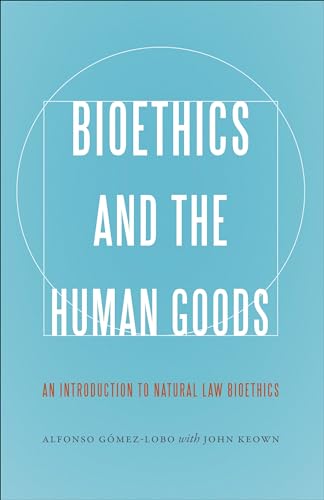Items related to Bioethics and the Human Goods: An Introduction to Natural...

Synopsis
In this concise and accessible introductory text Gomez-Lobo and Keown introduce a "human goods" approach to bioethics as an alternative to the dominant principle-based method in the field (best illustrated by Beauchamp and Childress, Principles of Biomedical Ethics, OUP). Following Aristotle and the natural law tradition the authors demonstrate how an emphasis on human goods--such as health, life, family, friendship, work and play, the experience of beauty, knowledge, and integrity--provides a necessary context for difficult medical decisions and can help us understand critical issues at the beginning and end of life. The manuscript includes two parts: Foundations and Issues. In the Foundations section the authors explain how one can think about bioethics, offering definitions of ethics and ontology (the study of being) and prudential reasoning. In the Issues section they address genetics, abortion, infanticide, suicide and physician-assisted suicide, nutrition and hydration, and transplantation ethics. The book includes appendices featuring personal statements by Gomez-Lobo on the status of the human embryo and criteria for the determination of death.
"synopsis" may belong to another edition of this title.
About the Author
Alfonso Gomez-Lobo (d. 2011) held the Ryan Chair in Metaphysics and Moral Philosophy at Georgetown University. He was a leading authority on classical philosophy and on bioethics. He specialized in Greek philosophy and historiography, the history of ethics, contemporary natural law theory, and bioethics. He was the recipient of several awards, including a research fellowship from the Guggenheim Foundation, and was a member of the President's Council on Bioethics. His many publications include Morality and the Human Goods. John Keown holds the Rose F. Kennedy Chair in Christian Ethics in the Kennedy Institute of Ethics at Georgetown University. He previously taught the the law and ethics of medicine at Cambridge University. His research has been cited by distinguished bodies worldwide, including the US Supreme Court and the Law Lords. In 2015 Oxford University awarded him the degree of DCL, or Doctor of Civil Law, in recognition of his contribution to the field of law and bioethics.
"About this title" may belong to another edition of this title.
£ 6.69 shipping from U.S.A. to United Kingdom
Destination, rates & speedsSearch results for Bioethics and the Human Goods: An Introduction to Natural...
Bioethics and the Human Goods: An Introduction to Natural Law Bioethics
Seller: No waste books, San Diego, CA, U.S.A.
Hardcover. Condition: As New. Dust Jacket Condition: As New. 1st Edition. Like new condition. May contain stickers or stamps from previous library. Seller Inventory # 000069
Quantity: 1 available
Bioethics and the Human Goods : An Introduction to Natural Law Bioethics
Seller: GreatBookPricesUK, Woodford Green, United Kingdom
Condition: As New. Unread book in perfect condition. Seller Inventory # 23785768
Quantity: 3 available
Bioethics and the Human Goods: An Introduction to Natural Law Bioethics
Seller: Ria Christie Collections, Uxbridge, United Kingdom
Condition: New. In. Seller Inventory # ria9781626162716_new
Quantity: 3 available
Bioethics and the Human Goods : An Introduction to Natural Law Bioethics
Seller: GreatBookPricesUK, Woodford Green, United Kingdom
Condition: New. Seller Inventory # 23785768-n
Quantity: 3 available
Bioethics and the Human Goods: An Introduction to Natural Law Bioethics
Seller: THE SAINT BOOKSTORE, Southport, United Kingdom
Hardback. Condition: New. New copy - Usually dispatched within 4 working days. 348. Seller Inventory # B9781626162716
Quantity: 3 available
Bioethics and the Human Goods : An Introduction to Natural Law Bioethics
Seller: GreatBookPrices, Columbia, MD, U.S.A.
Condition: As New. Unread book in perfect condition. Seller Inventory # 23785768
Quantity: 8 available
Bioethics and the Human Goods: An Introduction to Natural Law Bioethics
Print on DemandSeller: Revaluation Books, Exeter, United Kingdom
Hardcover. Condition: Brand New. 1st edition. 124 pages. 8.75x5.75x0.50 inches. In Stock. This item is printed on demand. Seller Inventory # __1626162719
Quantity: 2 available
Bioethics and the Human Goods
Seller: World of Books (was SecondSale), Montgomery, IL, U.S.A.
Condition: Good. Good condition ex-library book with usual library markings and stickers. Seller Inventory # 00085435583
Quantity: 1 available
Bioethics and the Human Goods : An Introduction to Natural Law Bioethics
Seller: GreatBookPrices, Columbia, MD, U.S.A.
Condition: New. Seller Inventory # 23785768-n
Quantity: 8 available
Bioethics and the Human Goods
Seller: moluna, Greven, Germany
Gebunden. Condition: New. Emphasising on human goods such as life, health, friendship, and knowledge and the wrongness of intentionally turning against them, the book provides a valuable approach to controversial bioethical questions at the beginning and end of life. Its approach co. Seller Inventory # 37118412
Quantity: 3 available

